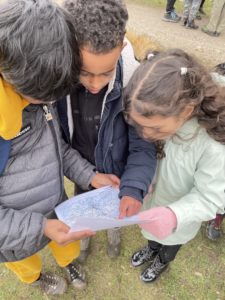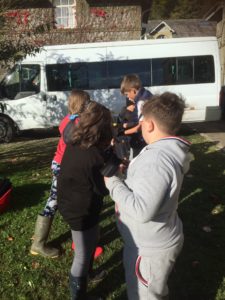
The Nature Friendly Schools project partnership which included some of the UK’s leading outdoor learning and mental health and wellbeing organisations. The partnership was led by The Royal Society of Wildlife Trusts and supported by YoungMinds, Groundwork UK and the Sensory Trust. The project was funded by DEFRA and the Department of Education and supported by Natural England
Between Summer 2019 and the end of the project in March ‘22 20+ FSC staff were involved with development and delivery of the Nature Friendly Schools project, both alongside and as part of their ‘normal’ roles. Across the two and half years of the project FSC worked with 188 Primary, Secondary and Special schools and Alternative Provision Institutions schools across England. Most schools were new to the FSC and in areas that FSC has traditionally found hard to reach, located in areas experiencing disadvantage.

The project generated £280k+ of income for FSC during the challenging pandemic period by…
What lessons should FSC take from Nature Friendly Schools and embed across the charity?
Embed learning from pilots into mainstream
FSC should use externally funded projects to pilot new ideas and fresh approaches, then invest in ways of embedding learning and best practice into mainstream FSC delivery where appropriate and product development.
Personalised learning
Feedback during Nature Friendly Schools demonstrates that teachers want personalised support; FSC should consider the best ways to encourage personalised conversations with teachers and support for teachers, encouraging the integration of fieldwork and outdoor learning linked to the curriculum (or extracurricular) and supporting them to develop their skills.
Invest in strong partnership working and communication
When working with multiple delivery organisations it can be challenging to ensure communication is organised, with clear standardised language and effective reach both across organisations and to project recipients. If this isn’t considered at the beginning of delivery, there’s the potential to create a confused story for the final recipients.
Build in impact evaluation at all stages
We know that many people have fantastic experiences whilst taking part in residential fieldwork or outdoor learning experiences with FSC. During Nature Friendly Schools we’ve captured a wide range of feedback from learners and staff taking part in outdoor learning across various locations. Can we effectively and efficiently capture the short, medium and long impacts of an experience with FSC upon pupils and school staff in a simple, standardised, proven manner.
Proactive inclusivity in fieldwork
Work with teachers and learners to take steps to ensure all pupils feel able reach their potential during FSC fieldwork by sharing strategies to support the mental health and wellbeing of all our visitors, including staff training.
Creating teacher empathy
Consider how we should recognise and communicate our understanding of the pressures classroom teachers are under, as well as curriculum content across familiar subjects and cross cutting themes beyond this.
Use learning to develop FSC’s connections with underrepresented schools
There is potential to build on the success of NFS to help us engage with schools that are currently less likely to engage with FSC. This could sit alongside the development of an offer with the aim of expanding our teacher training experiences and upskill our staff, whilst encouraging more teachers to take part in an FSC experience with their school and/or class.